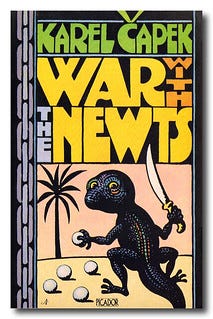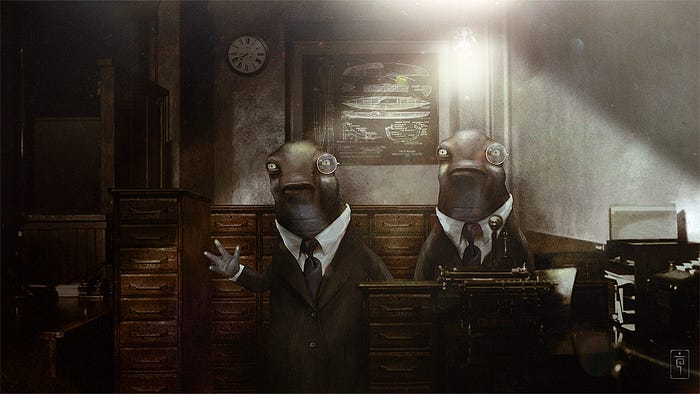“The earth will probably sink and drown; but at least it will be the result of generally acknowledged political and economic ideas, at least it will be accomplished with the help of the science, industry, and public opinion, with the application of all human ingenuity! No cosmic catastrophy, nothing but state, official, economic, and other causes. Nothing can be done to prevent it.”
Even as the fate of humanity hangs by a thread, with the newt dominion blockading every coast on the planet, it’s personal interest, nationalism, and greed that keeps us from securing our own salvation. This leads us to the question, are we as humans cursed by our own human nature?

Let’s get in our time machine and travel back to the 1930s when an intelligent breed of newts was discovered off the coast of an island in the Pacific by an enterprising sea captain and inevitably enslaved and exploited by business interests in Karel Čapek’s The War with the Newts.
A cursory glance at the title might lead one to believe that The War with the Newts is an epic science fiction thriller about a contentious battle between humanity and its newt invader, but this couldn’t be further from the truth. In fact, it’s only in the final four chapters of the novel’s 26 chapters that focus on actual war. The rest of the book is a conglomeration of episodes, minutes from shareholders’ meetings, scientific publications, and clips from newspapers that document the exploitation and evolution of a new intelligent and serviceable breed of newt.
Behind The War with the Newts
Karel Čapek wrote The War with the Newts during a precarious political time in the 1930s. Europe had already endured the First World War, there were workers revolutions, there was a worldwide financial depression, colonial nations were battling for remaining land and resources, not to mention, Europe was inevitably heading towards a new World War. All of this is important to keep in mind because Čapek’s bird-eye view of world events almost feels prophetic of the horrors to come at the hand of fascist regimes.
For example, Čapek, like many Czechs of the time, was concerned by the nearby National Socialism developments of Germany. In his novel, Germany boasts of its uber-Newts, who are superior compared to all other newts in the world, and the nation even goes to the trouble of creating its own fictional history that centers around such claims. But Germany wasn’t the only nation or industrial entity to face scrutiny under Čapek’s satirical pen. He opined on America’s mobs who lynched newts as scapegoats for other problems they faced that is clearly in reference to racism and hate crimes in the United States.

Humanity and exploitation
In chapter 12 of Book 1, Čapek introduces the minutes from The Salamander-Syndicate, part of the larger Pacific Export Company, that serves as a shipping cartel led by G.H. Bondy, a childhood friend of Captain Van Toch who first discovered the newts. During the meeting, all members discuss the practical applications of the newts, from their labor to the question of whether they could be processed for food or not. At this point, newts are deemed inedible and their hides have no use — mind you, the intelligence of the newts is consequently undervalued.
However, in humanity’s efforts to find more applications for the growing population of newts, a group of scientists eventually answer the question of the edibility of newts. In one particularly telling passage, a newt working as a researcher had lost his usefulness and, in turn, becomes an experiment for his German colleagues:
“In this way we consumed the newt whom we had come to know as Hans; Hans was an educated and intelligent animal with a special talent for scientific work; it had worked in Dr. Hinkel’s department as a laboratory assistant and could even be trusted with delicate chemical analyses. We would spend entire evenings talking with Hans who enjoyed boundless curiosity. It became unfortunately necessary to dispose of Hans after he became blind after my experiments with trepanation. Hans’s meat was dark and with a slight flavour of mushrooms, but left no unpleasant effects. There is no doubt that in the event of need arising from war it would be possible to use newt meat as a cheap substitute for beef.”

The Rise of Civilization (History of the Newts)
So, after such injustices, do the newts fight back against their human overlords? Well, not exactly. In fact, despite their moderate intelligence, the newts are physically unimpressive at best. And when it comes to their own defense, their natural disposition is cowardly and they’re only effective with the right tools. Prior to receiving underwater guns and weaponry from humans, they were easy prey for the sharks.
To me at least, the newts resemble a proto-human civilization before humanity had the ability to defend itself from larger predators. The main difference between proto-humans and the newts being that the newts are a seafaring species with regenerative features, and humans are land-dwellers that have the ingenuity and creativity to construct tools.
With all that in mind, the newts are peaceful by nature and don’t seek vengeance against humanity, and only eventually attack in self-defense. In the second chapter of Book 2, The Rise of Civilization (History of the Newts), there’s a mystery posed by the Daily Star: Do Newts have a soul? This question isn’t answered outright. But there are episodes in the same chapter that convey the emotional capacity of newts. One such example is when a Czech couple while vacationing in the Galapagos, meets a newt on the beach who speaks their language. The newt is enthralled to meet someone who speaks Czech. He discovered the language in a book and presents his knowledge of the Czech culture and history with both enthusiasm and charm.

Finally, The War with the Newts
It’s only when the newts overpopulate the shallow coastlines that they reside within when they turn their explosives and tools inward to take earth from the continents in order to fill in the deep parts of the sea. This starts in Louisiana with huge fissures being drilled miles inland by the newts. Then, the newts declare their dilemma, how they don’t wish to hurt humans, but they must make more coastlines or they will perish from lack of space. In a twisted turn of events, the newts wish to buy the continents from the humans with all the gold they had unearthed in the sea.
And even as coastlines and seafaring nations are hacked away into the ocean, countries refuse to stop trading with the newts, still selling the newts explosives and food to serve their own pockets and economies and not wishing to unarm the newts that they now depend on for their own coastal defense. Competition between nations like England, France, Japan, and Germany keeps humanity from aiding one another, and one by one, armies and navies are all ground away by the drills and explosives of the newts.
Wolf Meynert The War with the Newts
The fictional philosopher Wolf Meynert professes his opinion that humanity is unsalvagable and that newtdom should be wise not to spare us. People have been separated by borders, cultures, languages, etc., but the newts all share a common interest. The publication Jabberwock, in fact, mentions:
“Wolf Meynert makes the cynical suggestion that heterogeneity is not conducive to happiness. Nations, professions, classes cannot live together permanently without crowding in upon each other, getting in each other’s way to the point of suffocation. Either live forever apart — something that would only be possible if the world were big enough — or in opposition, in a struggle for life and death. […] We have created a fiction of mankind which includes us and “the rest” in some sort of imaginary higher unity … It was magnanimous conceit. And for this supreme idealism, the human race will now pay with its inexorable disintegration.”

The book concludes with Mr. Povondra, a retired doorman who was the one to let Captain Van Toch in to speak with his employer Mr. Bondy. He’s your Czech everyman who simply wishes to do right by his family and feel a sense of accomplishment in the world. Early on in the novel, he boasts his pride of being the conduit to the newts and humanity, playing a role in history. However, as the newts become a threat, that same pride eventually turns to “shame and horror” — as Ben Dolnick of the New York Times puts it.
The End of The War with the Newts
Karel Čapek explains his original conception for the novel as, “you mustn’t think that the evolution that gave rise to our form of life was the only evolutionary process on the planet.” On August 27, 1935, Čapek wrote, “Today I completed the last chapter of my utopian novel. The protagonist of this chapter is nationalism. The content is quite simple: the destruction of the world and its people. It is a disgusting chapter, based solely on logic. Yet it had to end this way. What destroys us will not be a cosmic catastrophe but mere reasons of state, economics, prestige, etc.”
The War with the Newts paints a picture of exploitation for the sake of personal gain. This unfortunately is very much a part of our current systems of humanity. So, the next time you see that deal on those shoes or choose to upgrade your cellphone every year, imagine what goes into such products to make it all possible. It may be due to the exploitation of whole communities and peoples. And in the end, such systems may very well lead to humanity’s own undoing.
